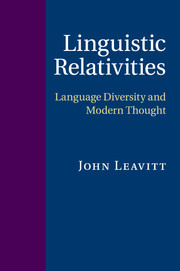Book contents
- Frontmatter
- Contents
- Preface
- Introduction
- 1 A passage to modernity
- 2 One reason, one world, many monads
- 3 The world at war with reason: Britain and France in the eighteenth century
- 4 Multiplicity and the Romantic explosion
- 5 Essences and universals through the nineteenth century
- 6 Boas and the linguistic multiverse
- 7 Linguistic relativity: Sapir, Lee, and Whorf
- 8 The other side of the mirror: a twentieth-century essentialism
- 9 The rise of cognition and the repression of languages
- 10 The return of the repressed
- Conclusion
- Notes
- References
- Index
5 - Essences and universals through the nineteenth century
Published online by Cambridge University Press: 04 April 2011
- Frontmatter
- Contents
- Preface
- Introduction
- 1 A passage to modernity
- 2 One reason, one world, many monads
- 3 The world at war with reason: Britain and France in the eighteenth century
- 4 Multiplicity and the Romantic explosion
- 5 Essences and universals through the nineteenth century
- 6 Boas and the linguistic multiverse
- 7 Linguistic relativity: Sapir, Lee, and Whorf
- 8 The other side of the mirror: a twentieth-century essentialism
- 9 The rise of cognition and the repression of languages
- 10 The return of the repressed
- Conclusion
- Notes
- References
- Index
Summary
Most intellectual genealogies derive Boas's thinking on language and culture, as well as the idea of linguistic relativity, directly from Herder and Humboldt (e.g., “The line of descent from the German cult of linguistic relativity practised by von Humboldt and his followers … to the work of Whorf is clear and unbroken” [Haugen 1987: 138, referring to Christmann 1967]). This is usually done via a leap from the beginning to the end of the nineteenth century (e.g., Schaff 1964 [1973]; R. L. Brown 1967; Miller 1968: 14–34; Penn 1972: 15–22; Malkiel 1974; Steiner 1975: 89). But the period between the relatively coherent essentialism of Humboldt and the Romantics and the relatively coherent relativity of the Boasians, which is to say most of the nineteenth century, in fact held a series of connecting figures in philosophy, linguistics, and anthropology.
The nineteenth century was marked by increasing confidence in natural science and the method of taking particular phenomena out of their context to regroup, classify, and explain them on the basis of universal laws. In Britain, in particular, the full application of this natural-scientific method to human history led to the rise of evolutionism and the constitution of anthropology as a comparative science. In Germany, the increasing prestige of the natural sciences was offset by the positing of a category of cultural or spiritual or historical sciences (Kultur- or Geisteswissenschaften) that required the use of different methods: in studying the work of an author or artist, the literature or art of a people, or the spirit of a civilization or a historical period, what mattered was the phenomenon in its context, as part of a unique whole; the goal was to interpret such wholes by seeking to define the spirit that made everything within them intelligible.
- Type
- Chapter
- Information
- Linguistic RelativitiesLanguage Diversity and Modern Thought, pp. 96 - 112Publisher: Cambridge University PressPrint publication year: 2010

